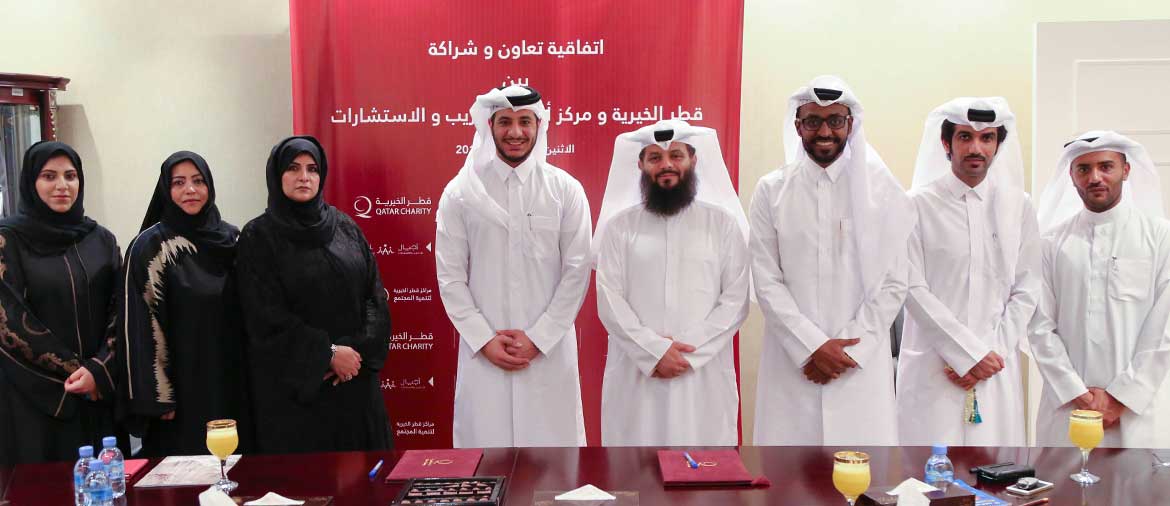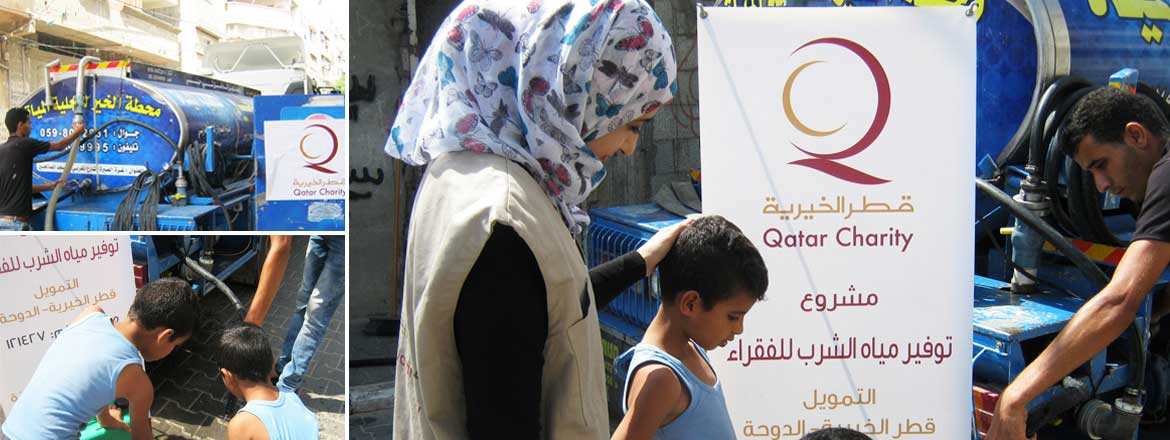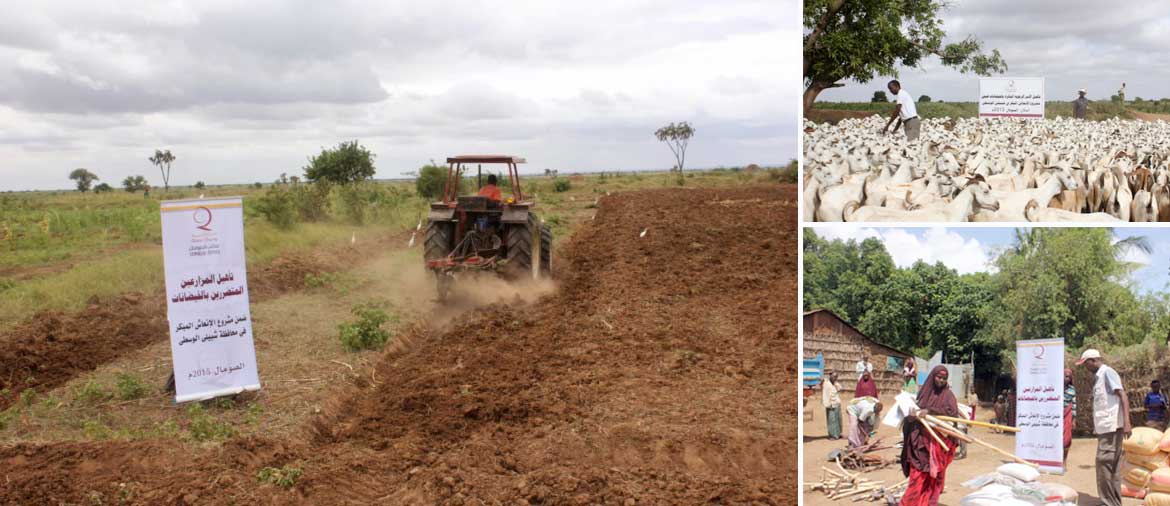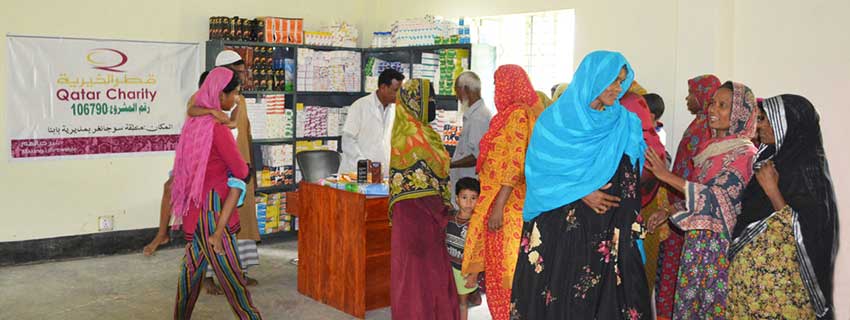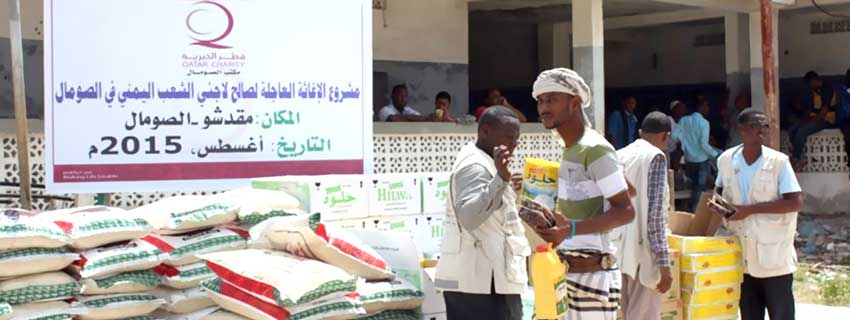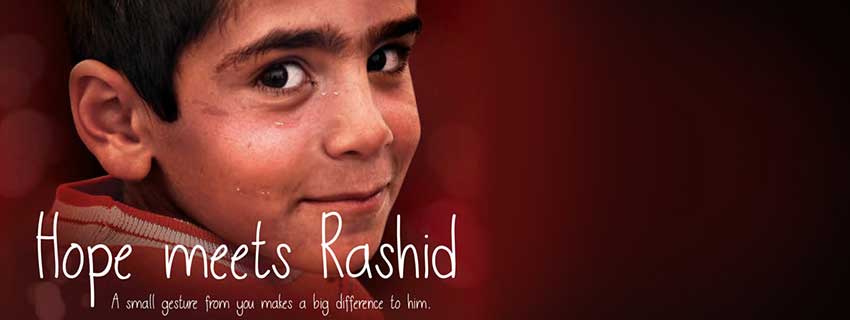QC signs MoU with IGAD
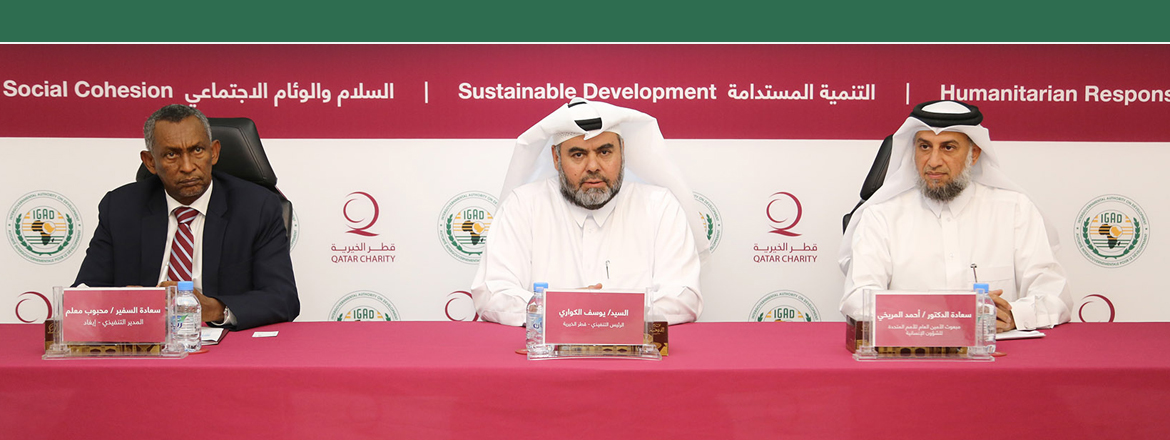
2018-05-15T03:02:19+01:00

Qatar Charity (QC) signed a memorandum of understanding (MoU) with the Intergovernmental Authority on Development (IGAD) in the presence of the UN Secretary General's Humanitarian Envoy, Dr. Ahmed Al Meraikhi, to enhance cooperation in the field of Emergency Relief, humanitarian assistance and sustainable development in the Horn of Africa.
The agreement was signed with the aim of entering into a strategic partnership to complete relief and development projects implemented by QC’s field offices in East Africa.
Dr. Ahmed bin Mohammed Al-Meraikhi, expressed his pleasure at attending the signing of the MoU, which would strengthen the UN approaches to bridge the gap between relief and development, hoping that the MoU would be successful.
Cooperation
QC's Chief Executive Officer, Yousif bin Ahmed Al Kuwari said we welcome cooperation with regional and international institutions in the field of relief, humanitarian assistance and development, including IGAD. He emphasized that QC and IGAD will cooperate on issues of common concern, including providing services and implementing humanitarian projects within the framework of the overall objectives and sectors of mutual interest.
He pointed out that Qatar Charity affirms its keenness to ensure the success of this partnership in order to achieve the agreed goals, which include alleviating the suffering of the affected people, contributing to restoring peace and social harmony in the countries affected by the conflicts in the IGAD region, advocacy of humanitarian and development issues and capacity-building, and focus on sustainable development programs in education, culture, health, water, and sanitation production, food security, alternative livelihoods, fisheries, livestock, dry-land farming and others.
IGAD’s Executive Secretary Mahboub Maalem said I am delighted to have signed this MoU with an institution known for its great capabilities to carry out the humanitarian and development work. He pointed out that the both parties would consult on the selection of partners in countries where there is no field office for any of them, and that IGAD undertakes to use existing structures in member states with a view to completing any project agreed upon by both parties.
Based on the MoU, the IGAD will focus on a number of interventions, the most important of which are the production and food security sectors, including alternative livelihoods, fisheries, livestock, dryland agriculture and food and climate early warning, as well as trade, investment, financial integration, infrastructure, support services and cooperation among member states in health, migration and other sectors, Maalem added.
Exchange of experiences
In accordance with the MoU, IGAD’s expertise might be sought by Qatar Charity, if needed. Both parties also agreed to provide funding from their own sources or from their strategic partners and donors for the implementation of projects as well as they agreed to consult immediately in case of emergencies with the aim of coordination of a common response. Emergency cooperation includes the use of the partners’ network for Emergency Relief and Assistance.
IGAD
IGAD, based in Djibouti, is a regional integration institution comprising Djibouti, Eritrea, Ethiopia, Kenya, Somalia, Sudan, Southern Sudan and Uganda, and promotes cooperation among member states through the implementation of common policies and programs aimed at achieving development and progress.
Related News
QC Signs a Cooperation Agreeme
QC signed a cooperation agreement with Ajyal Center for Training and Consultancy through which QC’s administration of developmental centers and Ajyal Center would cooperate to offer developmental and social services to the society by organizing activities, events and different programs, and holding training and educational courses.
Mr. Abdul Nasser Al-Zahr Al-Yafi’ee, QC’s Executive Director of Local Development, and Mis. Ghada Ayoush, the Director General of Ajyal Center for Training and Consulting, signed the agreement in Qatar’s office in Duhail.
The signed cooperation agreement stipulates that both parties shall cooperate by sharing their experiences and potentials in the field of developmental and social services so as to provide distinguished community service. They also agreed on mutual coordination to hold several purposeful activities and developmental programs.
Mobilizing Efforts
Mr. Abdul Nasser Az-Zahr Al-Yafi’ee, QC’s Executive Director of Local Development, said that this is part of QC’s efforts to support developmental work; that is related to training and expertise improvement. The goal is to make a quantum leap in that field. He pointed out to the big efforts which must be exerted in order to overcome a lot of obstacles.
Al-Yafi’ee also added that through this agreement with ‘Ajyal’ Center, QC is trying to mobilize all the efforts to achieve the desired goals. The two parties agreed to work together in every possible way to serve all the developmental projects to serve the Qatari society.
Mr. Al-Yafi’ee expressed his gratitude to Ajyal Center for Training and Consultancy for its participation in the development process. He also emphasized QC’s willingness to cooperate and help in developing Qatar to see the Qatari 2030 vision come true.
Capacity Building
Ms. Ghada Ayoush, Director General of Ajyal Center for Training and Consulting, sincerely thanked QC and its staff members. She said that ‘Ajyal’ Center believes in training the Qataris to become leaders and to improve their skills. It also aims at achieving its goal of empowering the Qatari pepole so as to bring the Qatari 2030 vision to become a reality. Finally, as part of the center’s efforts to make real partnerships with local institutions, it welcomed the implementation of such initiative with QC; the international and local pioneering charity, which the center shares so many objectives.
Ayoush added that this agreement would be the beginning of cooperation between QC and ‘Ajyal’; such cooperation will create something creatively new that will keep up with the modern challenges. “We aspire to invest this agreement in mobilizing efforts to increase the knowledge of the members of the society and to increase their cultural understanding. With the help of training experts, we will make several activities and awareness programs through scientific and educational methodology. Our priority is to reinforce the values of the youths. We will do everything we can to achieve this goal. We will actively and seriously work with QC to identify our general goals and plan the way we are going to achieve them.”
Purposeful Agreements
QC had already signed an agreement with Tomooh for Voluntary Work Management in order to present a distinguished social work.
In addition, a number of agreements were signed with famous sport figures and journalists so as to be the ambassadors of good values.
In its headquarter in Doha, QC also signed cooperation, educational sponsorships, and voluntary initiatives agreements with educational centers and youth and voluntary institutions. They all aimed at serving the society and encouraging the Qatari youth to do voluntary work. For example, they inaugurated initiatives such as Salati (my prayer), Al-Majales Madares (sessions are like schools), and Suhba (companionship). QC also signed an agreement with ‘Layan’ campaign to relieve the Syrian refugees in Lebanon, and another agreement with ‘Rowad’ center. These agreements include the implementation of projects and developmental and educational programs inside Qatar and voluntary and relief campaigns outside Qatar.
QC Implements ‘Providing Drink
Through its office in the Strip and in cooperation with Ghaith for Relief and Development, QC has recently started implementing ‘Providing Drinking Water’ project to the poor. More than 3,000 poor families are expected to benefit from it. It will take around 8 months for the project to be implemented at a cost of 262,000 QR.
Kidney Diseases
The Municipalities in the Strip provide the citizens with salty water only, which could cause many different diseases such as kidney diseases. Therefore, QC decided to implement this project in order to provide the poor families with good drinking water.
Eng. Mohammed Abu Halloub, QC’s Office Director in the Strip, said that this project is being implemented because QC wants to alleviate the sufferings of those who cannot afford to get good drinking water, and to prevent the diseases spread because of water pollution. He also emphasized the fact that water projects are on the top QC’s priorities’ list since the siege and the attacks on the Strip have destroyed all of the water networks, which were not even sufficient.
QC, as he also mentioned, will not spare an effort until it has helped the needy families and offered a good living opportunities for the needy; whether through relief or development projects.
Water Crisis
The Strip’s aquifer is both polluted and empty which made the Strip suffer from a dire water crisis. As a result, the Gazan families who are financially stable buy filtered water, while the poor families still use the brackish water provided by the municipalities.
To help face this crisis, QC is implementing a project to filter rainwater and to inject it into the aquifer in around 30 public schools.
The UN had already warned from the worsening situation of water in the Strip. According to the UN’s report, if the current conditions remain the same, the situation in 2016 will be catastrophic. The Strip is in great need for desalination plants a hundred times more than roads.
Reconstruction of Gaza
After all the destruction and wreckage the last aggression on the Strip caused, QC spared no effort to help rebuild the Strip.
More than 2,000 people were martyred during the aggression, 11,200 were injured, and thousands of families, whose houses were demolished, were displaced. Furthermore, many infrastructure facilities such as roads, hospitals, schools, and factories were destroyed.
The last brutal attack on the Gaza Strip caused the loss of so many people, houses, and facilities. 2,139 were martyred: 579 of them were children, 264 of them were women, and 102 were elders. 11,200 people were injured: 25% of them became handicapped. 1,000 children became permanently disabled. 2,088 women, 3,374 children and 410 old people were injured. 1,200 families lost their breadwinners. 90 families were entirely eliminated and 49 massacres were executed.
In addition, 466,000 citizens were displaced, 2,360 houses were completely destroyed, 13,644 houses were partly destroyed, 30,000 workers lost their jobs, and 134 factories were completely demolished. The destruction of Gaza cost a financial loss of 3,500,000,000 USD.
You can donate to support such projects through the link: Click here
QC Implements Tens of Qualitat
- Hundreds of goats were distributed to the people to help them start over.
- Tens of hectares were restored for 250 families whose lands had been flooded.
As part of its early relief program to the victims of floods in the Middle Shebelle governorate in Somalia, QC implemented qualitative income-generating projects from which 400 families of the same governorate benefited.
Rehabilitation:
The projects included rehabilitation of the affected families and improvement of their life quality, in addition to supporting agriculture and shepherding. The program also included funding income-generating projects. For example, 750 goats were distributed to 150 families. Each family received 5 goats. This project was to enable them to get their ordinary lives back after the floods. The project also aimed at supporting shepherding and providing these families with a source of income that matched their previous professions.
QC has also restored agricultural lands in a total area of 250 hectares for 250 families who had worked in farming before the floods damaged their lands.
QC seeks to rehabilitate the agricultural and shepherding societies and start agricultural and shepherding businesses by supplying the workers with seeds and pesticides as well as manual cultivation instruments needed for local production. QC also helps them in their farmland restoration, and irrigation canals’ reformation. The program also supplied them with some cattle.
Terrible Immigration
The regions adjacent to the two rivers of Shebelle and Juba witnessed heavy rains in last October and November which led to the flooding of the rivers and caused a disastrous immigration of the inhabitants of the rivers’ banks. Middle Shebelle was mostly affected as most irrigation canals and flood control systems were damaged along the Shebelle River by these floods. Reports show that about 10,000 of the local inhabitants left their flooded cities, villages, and farms.
The objective QC had of the early relief project was to reach the local affected community in the governorate as it helped rehabilitate them in their crafts and professions. QC’s goal was to enable them to increase their daily income and enhance their life quality through a number of strategic projects including shops, production machinery, animals, and farmland restoration. This should facilitate their future confrontation to yearly floods. This project also seeks to restore artesian aquifers, reform schools and damaged clinics to help 93,000 people living in the region.
Tens of Thousands Beneficiaries
It is worth mentioning that QC has recently implemented various projects in Somalia including education, health, building mosques, and funding income-generating projects. Tens of thousands of Somalis around Somalia benefited from these projects. Of its construction projects in Puntland, QC inaugurated the reformation of 2 health centers and 2 preliminary schools at a cost of about 292,000 QR.
QC inaugurated the opening of 9 mosques, and 8 centers for memorization of Qur’an in 3 provinces in the north of Somalia: 3 mosques in the coastal province, 3 others in Burco, 1 in Awdal, and 2 in Hiran and Banaadir. It also built 8 centers for Qur’an memorization in Hiran, Banaadir, and Hargeisa. Thousands of Somalis shall benefit from these mosques and centers.
QC office in Somalia has also organized events of distributing sewing machines to 65 productive families in Mogadishu and Hargeisa city in Somaliland in cooperation with Jedoon Association for Woman and Child Development in Hargeisa and HINNA association in Mogadishu.
You can donate to support such projects through the link: Click here
QC Opens 13 Healthcare Centers
QC has recently opened 13 healthcare centers in different places in Bangladesh from which 500,000 people benefited at a cost of 1,000,000 QR.
QC made sure that the targeted beneficiaries are the neediest. Therefore, QC implemented the projects in the poorest districts which are Pabna, Kishoreganj , Gazipur, Naogaon, Madaripur, Barguna, Gaibandha, and Barisal.
Comprehensive Services
As part of the project, QC supplied these centers and the outpatient clinic with drugs and medical items. It also covered routine medical examinations. QC runs these projects either directly, or through its cooperation with local committees in order to sufficiently offer the basic services of medical care.
For this occasion, Mr. Mohammed Amine Hafith, QC’s Office Director in Bangladesh, said that QC implemented these projects out of its endless efforts to support the health sector in Bangladesh for its importance in the developmental process. QC tries to offer comprehensive services to the needy people of Bangladesh who live in rural areas where poverty and literacy are found. Thus, QC’s projects targeted these areas.
“These projects,” as he said, “will save the lives of so many people living there; especially chronic patients, women and children. They are the first victims of the lack of medical services. They are who need to cross long distances in order to be treated.” He then concluded his speech with, “QC will continue to exert efforts, it will continue to help and implement charitable and humanitarian projects. This is QC’s message and responsibility towards the poor, the needy, and the unfortunate.”
A Hospital & a Medical Center
Under its belief of the importance of the health sector, QC has recently implemented a medical project related to the Qatari Hospital and Medical center at a cost of 560,000 QR. It offers medical services to 100,000 people. It covers all kinds of treatments including outpatient and inpatient clinics, medical tests, radiology, and drugs. QC also offers training for the nurses, laboratory and radiology technicians, and pharmacist assistants. Doctors and specialists usually refuse to go to these distant places, which is why this training is very important. It helps prepare a qualified medical staff which can offer the patients the needed services. The inhabitants of these areas turn to warlocks who tend to deceive the families and trick them. They make use of the patients’ willingness to cling to any thread of hope, and make them believe that magic can heal them. With QC’s help, however, the trained staff will offer all the services these patients need at a low cost. This way, they will protect the people from imposters, risks, and health complications.
Ongoing Development
Bangladesh is universally ranked as one of the most overpopulated areas. It has a population of 170,000,000 people; 1,100 persons per km. The universally acknowledged rate is around 44 persons per km. Furthermore, it lacks the resources and depends mainly on the agriculture sector. It is, thus, one of the poorest and neediest countries. Its orphans, widows and unprivileged – especially those living in distant areas – need basic services; this is what QC tries to cover.
QC believes in its role in helping any person or place in need. It makes sure to implement qualitative and useful projects, to increase the number of beneficiaries, to fulfill its role in the social developmental process, and to positively affect people’s lives. As a result and after considering Bangladesh’s conditions, QC is doing its best to fulfill its part in the ongoing developmental process. It is doing so through helping increase production, raise the standards of living, and enhance the income of the neediest
You can donate to support such projects through the link: Click here
QC Implements Relief Projects
- The aids are sufficient for the refugees and returnees for a month
- Members of the Somali Parliament and Representatives of the Yemeni community contributed in the distribution
Through its office in Somalia and as part of its relief campaign “Yemen, We are With You”, QC implemented an urgent relief project which targeted 600 families of the Yemeni refugees in Somalia and some of the Somali returnees from Yemen who are living in Mogadishu, Hargeisa, and Bosaso.
The food baskets, distributed to the beneficiaries, were sufficient for a whole month. Each family received 25 kg of rice, 25 kg of flour, 15 kg of sugar, 3 liters of cooking oil, 2.5 kg of powder milk, and 2 kg of dates.
Prominent Figures
Many prominent figures took part in the distribution of the aids to the people, including some members of the Somali parliament, and the representatives of the Yemeni community in Somalia. They all commended QC’s role in helping the Yemeni and Somali peoples.
This is one of so many other projects in which QC continues to fulfill its role in aiding and helping others. In addition, QC always makes sure that its beneficiaries are the neediest. The Yemeni people are suffering from a dire crisis which forced the families to emigrate and ask for asylum. This, of course, left the families without any living necessities.
Although Somalia is suffering from hard conditions and security issues, it became one of the countries which received the Yemeni refugees. Therefore, it is now the responsibility of those who work in charity and humanitarian fields to strengthen their efforts so that Somalia does not suffer from a critical condition, too.
130,000 Beneficiaries
130,000 beneficiaries benefited from QC’s continuous campaign ‘Yemen, We Are with You’ since the recent Yemen crisis started and until the end of last May (2015).
The food aid included 17,300 food baskets, 80 tons of flour, and 180 tons of different types of food which were distributed to the different governorates. Furthermore, 3 kitchens were prepared and equipped with foodstuff to provide daily fresh meals for 1,000 persons. Regarding healthcare, the hospitals of Aden, Ma’rib, and Taiz were supplied with some equipment, 100 first-aid bags, and a large amount of medications, and medical disposables.
In addition, 8 water tanks were distributed in Aden with the capacity of 1,000 liters. QC also distributed hundreds of mattresses and blankets to the displaced families there. Another project was funded to clean Aden Municipality in cooperation with its workers.
Call for Help
It is worth mentioning that when the Yemeni crisis started, QC appealed for help to provide 1,260,000 conflict-affected people with food, and medications.
After its appeal and as a first step, QC launched its campaign ‘Yemen, We Are with You’ to collect 36,500,000 QR (10,000,000 USD) to urgently deliver these humanitarian aids to the most affected categories.
QC also supervised the distribution of aids which Qatar sent to the people of Yemen. The aids were delivered through an air bridge from Doha to Djibouti–Ambouli International Airport following the instructions of his highness Sheikh Tamim bin Hamad Al Thani, God bless him. The aids were delivered over two days; there were 4 airplanes which carried 240 tons of different materials.
The aids were received by a delegation of QC which included Mr. Ibrahim Ali Abdullah, QC's Relief Department Director, and Mohammed Wa'i, QC's Office Director in Yemen.
QC’s field team was able to aid many conflict-affected families since the crisis first started in Aden and other Yemeni cities. They provided the families with food, drugs, and medical disposables. They sent the medical supplies to the hospitals so that they would treat the injured. The team also provided the families with food baskets and other basic and necessary items.
You can donate to support such projects through the link: Click here
Pizza Hut and QC cooperate to
Arsel Al-Amal (Send Hope) Initiative Continues to Provide School Meals to the Deprived Students in the Middle East
Pizza Hut in Qatar inaugurated “Send Hope” initiative supported by QC to provide school meals to the deprived students in the Middle East by supporting school nutrition projects of the UN’s World Food Programme.
This initiative allows Pizza Hut’s costumers, in all of its branches, in Qatar to donate to ‘School Meals’ project the amount they want. The donation is added to the costumers’ bills. With each Qatari Riyal given, a child will receive a meal at school. These children will have a better future to aspire for.
Last May, QC and WFP signed an agreement in WFP’s headquarter in Rome, Italy, to fight hunger and malnutrition, and to bolster food security worldwide. This strategic cooperation will strengthen the private sector’s role in the battle against these life-threatening challenges which threaten the lives of millions of people whether in the times of peace or conflict. These challenges also hinder the developmental efforts exerted in many countries.
Abdullah Al-Wardat, WFP’s representative and the Gulf’s Office Director, said, “We sincerely thank Pizza Hut for this great initiative which supports the Programme’s efforts to fight hunger and malnutrition by providing students with school meals in the Middle East. Our strategic cooperation with QC offers a chance to the Qatari private sector’s companies, which understand that fighting hunger and malnutrition is the primary element for their success and for the community’s stability. The companies also understand their moral duty towards the children and the country.”
In a press release, Sterling Cos’ representative, Pizza Hut franchiser in Qatar, said, “It’s our pleasure to cooperate with QC to implement “Send Hope” initiative. We hope it would help support WFP’s efforts to give meals to more than 2,600,000 needy students in the Middle East. I hope this would bring hope to their hearts; I hope it makes their lives better. Education is essential to build a bright future, especially to those with a limited income.”
Mr. Jassim Al-Mansouri, QC’s Marketing Manager, expressed his gratitude to Pizza Hut for this initiative, and expressed his happiness with this cooperation to serve the school children. He also showed his great trust in the companies of the private sector in Qatar and how sure he is that more companies will be involved in supporting such initiative. The private sector is known to be very generous and to have a sense of responsibility towards the needy communities around the world. Its efforts will stand as the practical application of the agreement which QC had signed with WFP. “Send Hope” is expected to be well received for its noble goals.
This cooperation between QC and WFP represents an opportunity for the private sector in Qatar to be more involved in supporting the fight against hunger by supporting QC’s and WFP’s campaigns for collecting financial and in-kind contributions according to the procedures of Human Appeal International. Companies are aware of the fact that by fighting hunger, ending malnutrition and bolstering food security, they can achieve success. They are also aware of the moral duty behind such battle.
